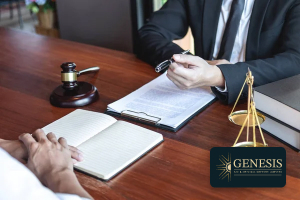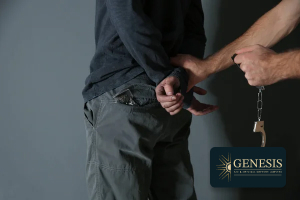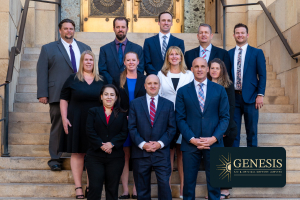
Facing criminal charges in Arizona can be a daunting experience, filled with uncertainties and questions. It's essential to understand the criminal justice process, your rights, and the steps you should take. Knowledge about the legal system can empower you to make informed decisions. At Genesis DUI & Criminal Defense Lawyers, we specialize in criminal law. A criminal defense lawyer from our team would be honored to defend you.
The process of dealing with criminal charges is complex, involving various legal procedures and rights. Understanding these processes is crucial for any accused person facing charges. The criminal process can be complex, but we will be with you every step of the way. This includes each court date, at the negotiating table, and in our office for meetings. In some cases, the goal is to create reasonable doubt. In other cases, your criminal case might be better served with a plea deal. We know that having a criminal record can be devastating, so allow us to answer a few common questions about the criminal process.

During a criminal investigation, you have specific rights designed to protect you. These consist of the right to remain silent and the right to an attorney. Understanding these rights is crucial for navigating the investigation process. Using these rights effectively can significantly impact the outcome of your case.
The Miranda Rights are a fundamental part of the criminal justice process. They advise you of your right to remain silent and your right to an attorney. Police must read these rights to you during an arrest. Understanding and invoking your Miranda Rights is crucial for protecting yourself during police questioning.
Miranda Rights are in place to protect you from self-incrimination. If police question you without reading these rights, any statement you make may be inadmissible in court. It's essential to assert these rights immediately upon arrest. Doing so ensures that you do not unintentionally provide information that could be used against you.
You have the right to an attorney as soon as you're arrested. This right is crucial for ensuring your defense is as strong as possible. A lawyer can assist you in understanding and navigating the legal process and help defend your rights. They can also provide crucial advice on how to handle police questioning and other interactions with law enforcement.
Having an attorney from the outset can make a significant difference in your case. They can help prevent you from making statements that could harm your defense. An attorney will also start building your defense strategy early, which can be critical for a positive outcome. It's important to exercise this right immediately upon arrest, regardless of whether you are arrested for assault, DUI, or a probation violation.

State and federal laws govern Arizona's search and seizure laws. These laws determine when and how law enforcement can search your property. Understanding these laws can help you know your rights if you're subjected to a search. Law enforcement must have a warrant or a valid reason to conduct a search without a warrant.
In some cases, police can search without a warrant if they have probable cause. This includes situations where evidence is in plain view or when there's a risk of evidence being destroyed. It's important to understand these exceptions and your rights regarding them. If your rights are violated during a search, this can impact the admissibility of evidence in your case.
Bail is an integral component of the criminal justice system in Arizona. It allows those accused of a crime to remain free while awaiting trial. The amount of bail and the conditions of release vary depending on the crime and the individual's circumstances. Understanding how bail works can help you prepare for the process.
The purpose of bail is to ensure that you return for court appearances. Failing to appear in court can result in forfeiting the bail amount and additional charges. Bail conditions may also include restrictions on travel or contact with certain individuals. It's crucial to comply with these conditions to avoid further legal complications.

Plea bargains are common in the Arizona legal system. They involve negotiating a deal with the prosecutor where you plead guilty to a reduced offense or receive a lighter sentence. Understanding how plea bargains work can help you make informed decisions about your case.
Plea bargains can be a means to avoid the uncertainty of a trial. They often result in reduced charges or lighter sentences. However, they also require you to plead guilty, which can have long-term consequences. It's important to weigh the pros and cons of a plea bargain carefully before making a decision.
Accepting a plea bargain can mean a quicker resolution to your case. It can also mean less risk of a harsher sentence if found guilty at trial. However, it's essential to consider the impact of a guilty plea on your record.
Negotiating a plea bargain involves discussions between your attorney and the prosecutor. Your attorney will work to secure the best possible terms for you. This can include arguing for reduced charges or advocating for specific sentencing considerations. The negotiation process requires skill and a thorough understanding of your case and the law.
The outcome of plea negotiations can depend on various factors. These include the strength of the evidence, the seriousness of the charges, and your criminal history. Your attorney will use their knowledge and experience to navigate these negotiations effectively. It's essential to have open communication with your attorney during this process.
Once you receive a plea offer, it's crucial to understand your options. You can accept the offer, negotiate for better terms, or decide to go to trial. Each choice has its own set of consequences and should be considered carefully.
Accepting a plea offer can provide certainty and potentially reduce the consequences of your charges. However, going to trial might be the better option if the evidence against you is weak or if the plea offer is not favorable. Your attorney will make sure you go through each option.
A criminal conviction can have a profound repercussion on the rest of your life. This record can hinder your ability to obtain employment, secure housing, and access educational opportunities. Understanding the potential long-term consequences is vital for making informed decisions about your case.
Criminal records can also affect your rights, such as voting and owning firearms. Some convictions can result in the loss of professional licenses or immigration consequences. It's crucial to consider these impacts when deciding how to handle your case.
In Arizona, criminal charges are classified as misdemeanors or felonies. Misdemeanors are not as severe and usually result in lighter penalties. Felonies are grave charges and can lead to significant jail time and fines. Understanding the differences between these types of charges is essential for your defense strategy.
Misdemeanor charges, while less severe, can still have significant consequences. Felony charges, meanwhile, can result in long-term impacts on your life. Your defense strategy should be tailored to the specific charges you're facing.

If you're facing criminal charges in Arizona, Genesis DUI & Criminal Defense Lawyers are here to help. We understand the stress and uncertainty that come with criminal charges. Our team is dedicated to providing you with the best legal representation and guidance.
We'll help you navigate the legal system, build a strong defense, and work towards the best possible outcome. Our goal is to minimize the impact of the charges on your life. Contact us today for a consultation.





"*" indicates required fields